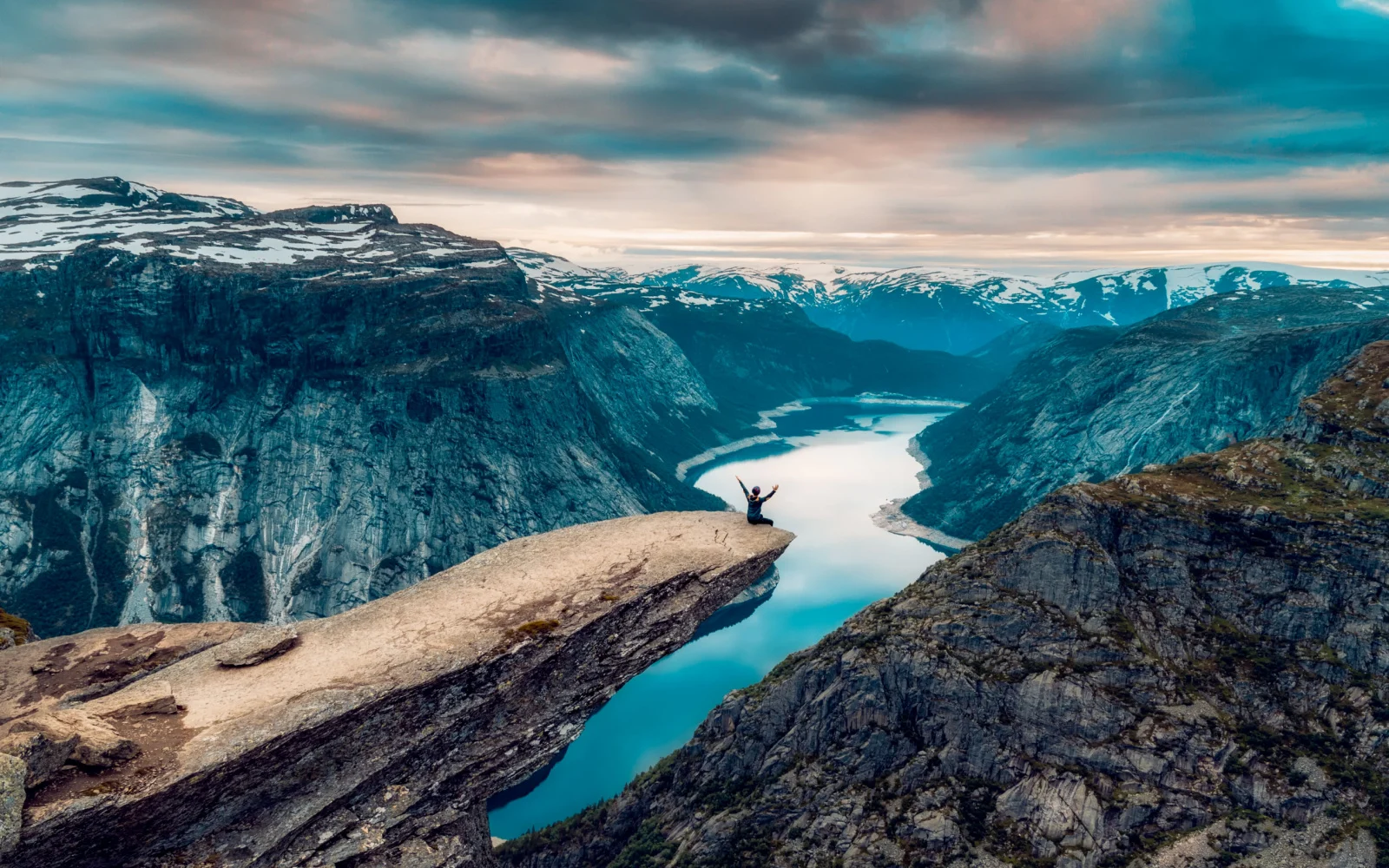Norway is a must-visit destination for nature lovers. The sparsely populated Scandinavian country has thousands of miles of pristine nature, from dramatic fjords to high mountains to sparse polar landscapes.
For visitors in search of creature comforts, Norway also delivers. You can enjoy the modern design and sophisticated atmosphere of the capital city of Oslo or head north to colorful, UNESCO-protected Bergen to take in some Norwegian history.
But while this storied country is rich in history, culture, and sights to see, is Norway safe to visit? Here’s our expert opinion.
Is Norway Safe to Visit in 2025?
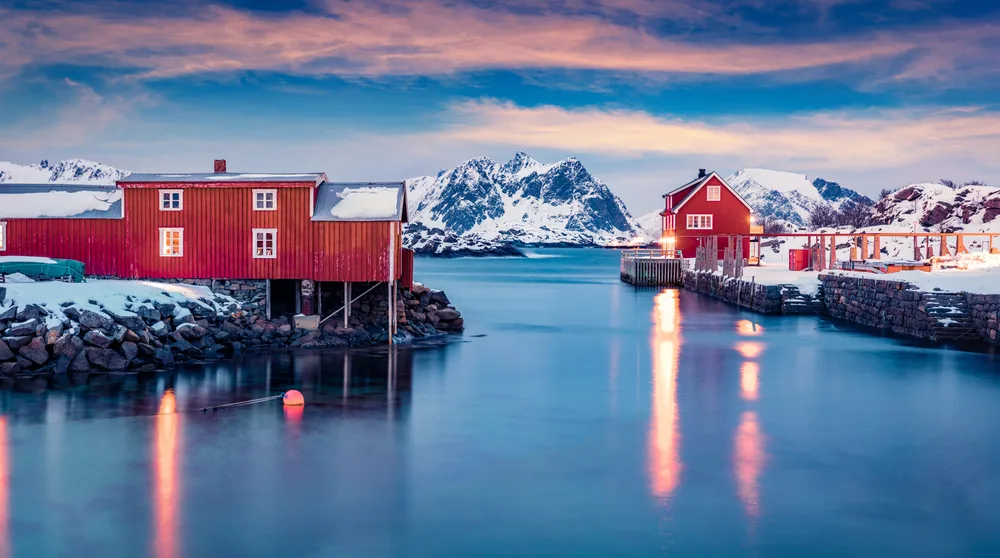
Andrew Mayovskyy/Shutterstock
Yes. Norway is a very safe country to visit, as it has an extremely low crime rate and excellent security.
Petty crime sometimes happens the way it does anywhere else, but besides taking a few basic precautions, you don’t need to be on your guard. A look at some travel advisories from other countries can help you get an idea if Norway is dangerous or not.
Most countries give their citizens the green light to travel to Norway freely. The United States just tells citizens to exercise normal precautions and puts Norway under a Level One travel advisory, the lowest possible level.
Norway may seem like a slice of heaven, but it is still a real place here on Earth. That means that it experiences the same problems anywhere else on Earth will experience, including crime.
Some common crimes in Norway include:
- Pickpocketing
- Bag snatching
- Fraud
- Gang violence
- Sexual assault
- Terrorism
Violent crime does happen, but it is rare — and even rarer for violent crime to affect foreigners. Overall, Norway is a very safe country, and most people have a wonderful experience when they travel there.
When thinking about safety in Norway, crime doesn’t have to be your primary focus since, as you can see, the risk is low. However, if you are planning on heading into nature, as most people who visit Norway do, make sure you take the appropriate precautions.
Although Norway has a much milder climate than other countries in the far North, thanks to the Gulf Stream effect, winters can still get very cold.
If you are skiing or going on any other winter wilderness adventures, make sure that you dress in layers and take precautions to prevent hypothermia. The official Norwegian government website is full of safety tips for visitors who want to come to the country and go on outdoor adventures.
When you go hiking, take precautions such as checking the weather reports, updating people not on your trip about your movements, and making sure you adapt the route to your ability.
If you are exploring Norway’s coastline, lakes, and fjords by boat, take precautions such as checking the weather, packing all equipment carefully, and wearing a life jacket at all times. Depending on the size of the boat, you may need to be a licensed boat pilot to sail it.
Just like you only need basic common sense to prevent crime, some basic common sense can also prevent you from having an accident in nature. Research routes ahead of time to make sure you have a great time wherever you go.
Crime in Norway
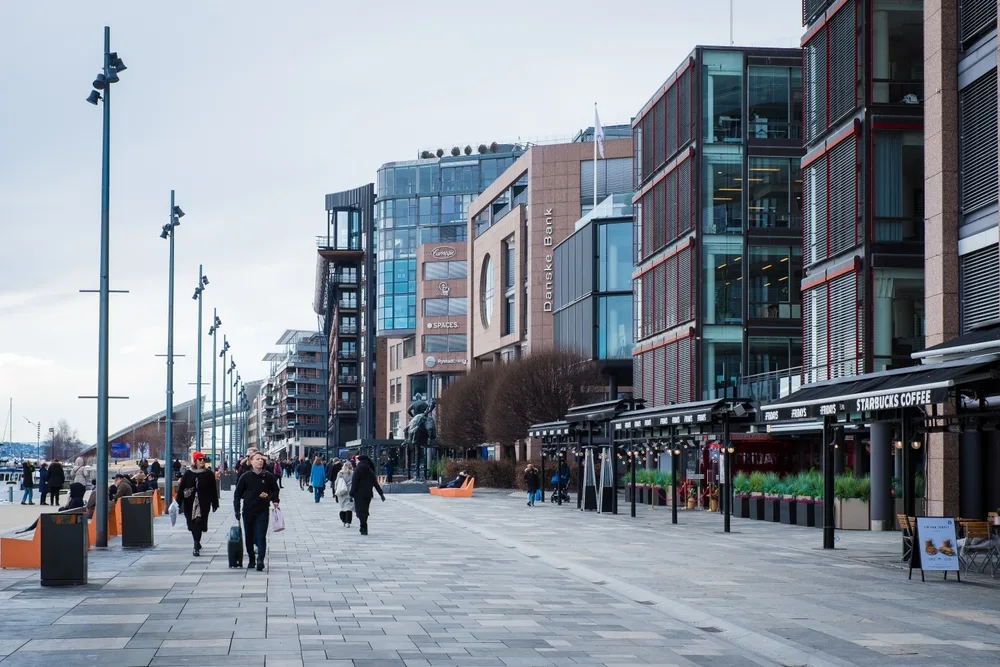
Oslo, Norway – March 11, 2023: Promenade in Aker Brygge district in Oslo/Cloudy Design/Shutterstock
As mentioned above, crime is not much of a concern in Norway for locals or for tourists. According to the Global Peace Index, Norway is the 17th safest country in the world.
It ranks so highly on safety thanks to its low levels of criminality and external and internal conflicts, although according to the organization running the Global Peace Index, it loses a few points due to its brisk trade in weapons.
The levels of violent crime in Norway are very low. According to World Bank data, the country experienced only 1 homicide per 100,000 people, a very low homicide rate. The rate for other violent crimes is also very low.
The overall crime rate is also very low. In 2021, Norway recorded less than 52 crime incidents per 100,000 people. Most crime incidents in Norway are petty in nature.
The most common type of crime in Norway is property crime, including theft and burglary, followed by traffic-related offenses. Violent crimes sit at a distant third place. There are a few reasons why Norway has such a low crime rate.
Norway is a very wealthy country with low income inequality and a well-developed social safety net, which eliminates the social factors that often cause crime.
It also has strict laws in place that reduce the opportunities for criminals to commit crimes, such as strict gun laws that limit the prevalence of weapons on the street. Norway does have some problems below its placid façade.
Oslo has organized criminal gangs, primarily biker gangs as well as newer gangs with international ties. These gangs are often behind violent incidents that occur, such as shootings on the street.
Although Norway’s social safety net and strong sense of community are cohesive, they don’t manage to incorporate everyone. Still, despite some problems, Norway’s overall levels of safety are high. You shouldn’t feel endangered at all when you go.
Pickpocketing
The type of crime you are most likely to encounter as a foreign visitor to Norway is pickpocketing. The Irish government warns its citizens about the low but present risk of pickpocketing and bag snatching around airports and railway stations, especially in the capital Oslo.
According to the Canadian government, the rate of petty crime increases in the summer, which is the high season for tourism in Norway.
Pickpockets and bag snatchers usually operate in areas where there are crowds — for example, around Oslo’s Central Station. Norway’s major international airports and routes leading to and from airports are also common targets for pickpockets.
Pickpockets often target tourists as they believe foreigners are less likely to be aware of their surroundings. Be careful in other areas that are known to attract foreign tourists, such as major tourist attractions, hotel lobbies, and cafés.
Luckily, it’s pretty easy to deter Norway’s pickpockets with just a few basic precautions. Make sure that your bags are zipped and held close to your body and that your valuables are in front pants pockets, not back pockets.
Don’t leave bags and other valuables unattended, even when talking to the concierge in a hotel lobby or going to the counter to pay in a café. Keep your hand over your bag when you are in a crowded area or on public transportation.
Scams are rare, but be careful anyway of people approaching you in the street. The scams that are present are usually betting games.
You should also be careful of people trying to distract you as they usually work in tandem with pickpockets. There is some risk of thefts escalating beyond pickpocketing to mugging or violent robbery, but this rarely happens.
To avoid being the victim of a mugging, use common sense when you walk at night, and stick to well-lit streets full of people, always avoiding isolated alleyways. Read up on sketchy neighborhoods, such as the area around Oslo’s Central Station, and avoid those.
Terrorism
It may seem unusual for such an overall peaceful country, but Norway has an elevated risk of terrorism. The risk of this crime is actually why New Zealand tells its citizens to exercise increased caution while in the country.
Recent terrorist attacks in Norway include a shooting at a popular Oslo LGBT club that killed two people in 2022, the Bærum mosque shooting of 2019, and the discovery of an undetonated bomb in central Oslo in 2017.
Perhaps the most notorious terrorist attack on Norwegian soil in recent years was the terrorist rampage of far-right terrorist Anders Breivik in 2011 when he killed 77 people in Oslo and at a youth camp on nearby Utøya Island.
Although Norway is at some risk of Islamist terrorism, most of the deadliest terrorist attacks in the country’s recent history were caused by far-right terrorists motivated by Nazi-like ideas about maintaining the “purity” of Norway’s society.
These attacks are high profile but rare, occurring once every few years. The likelihood of your being a victim of a terrorist attack on your vacation to Norway is low but still possible, so it is important to be aware of the risks.
Terrorism is, by definition, random, so you cannot fully prepare and avoid an attack. The Australian government gives its citizens some safety tips, such as staying alert while in crowded areas, reporting suspicious behavior to the police, and following local media.
You can also look on the Norwegian government’s official terrorist threat assessment website (the site is in Norwegian, but you can translate the page).
Avoiding Bad Areas
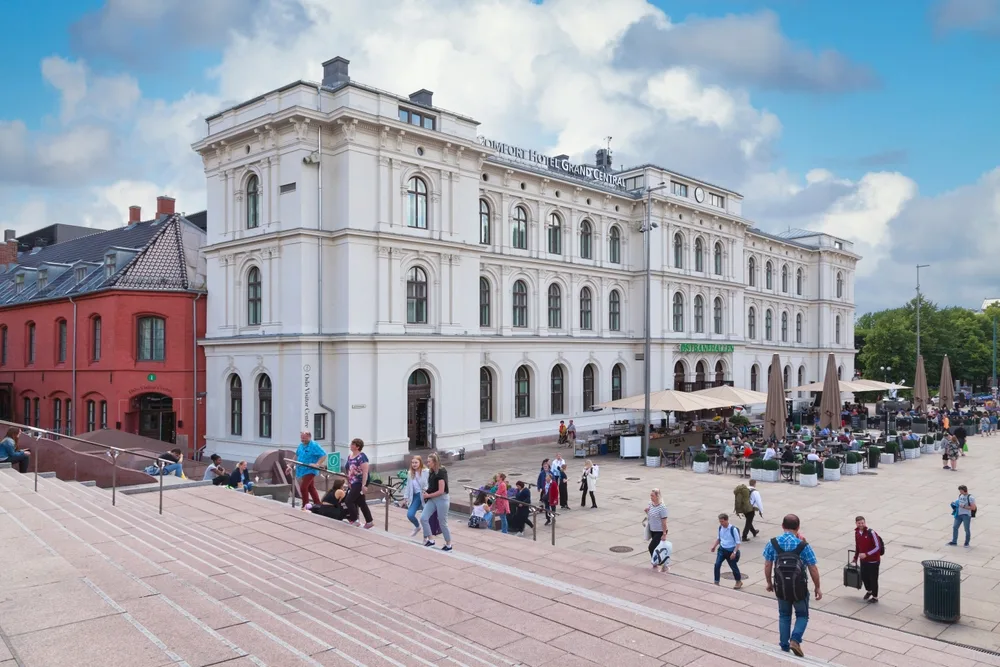
BreizhAtao/Shutterstock
Norway doesn’t have many dangerous areas per se. However, in the big cities, there are some neighborhoods that might be less safe than others.
In Oslo, the areas around railway stations, such as the Central Station, tend to be sketchier, so avoid going there at night. Some sketchier neighborhoods in Oslo include Holmlia, Søndre Nordstrand, Grønland, and Mortensrud.
Things to Consider
Here are a few other things to keep in mind when visiting Norway:
- When driving in Norway, keep in mind that you have to share the road with cyclists and that there is a risk of wildlife jumping in front of your car! Stay alert when driving and read up on regulations before you go.
- Credit card fraud sometimes occurs, so make sure you cover your PIN when using an ATM, only use secure ATMs, and check the charges on your card during your vacation.
- If you visit Svalbard, research safety tips for being around polar bears, as the far north archipelago has more polar bears than humans! Elsewhere in Norway, your risk of encountering a polar bear is low despite the stereotypes.
- Drug laws in Norway are very severe, so avoid using illegal substances while you are in the country.
Frequently Asked Questions
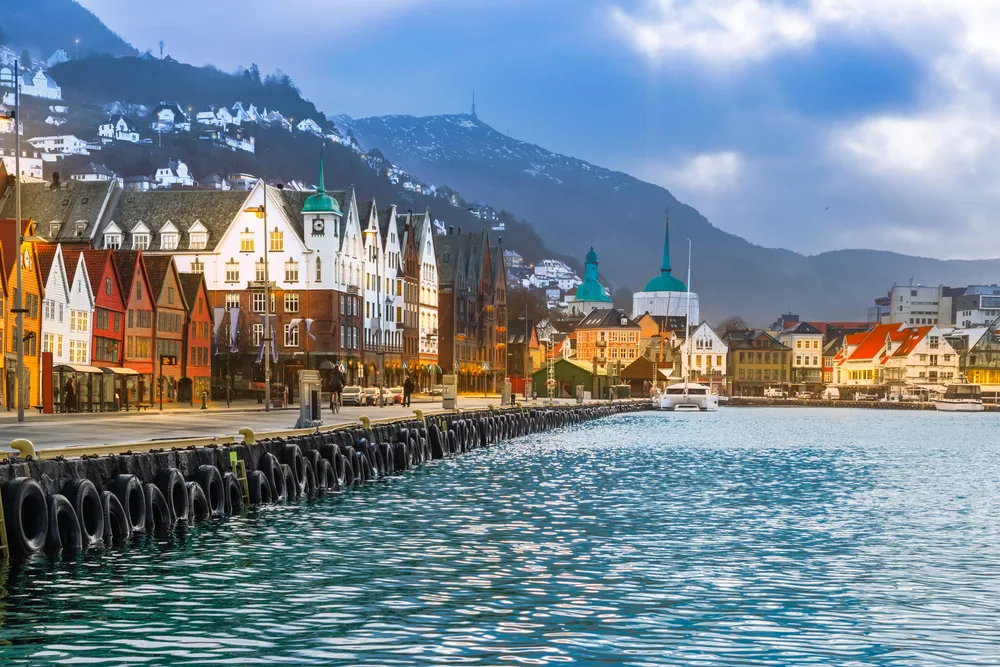
NAPA/Shutterstock
Here are some other questions you might have about visiting Norway:
Is Norway expensive to visit?
The safety of Norway comes at a cost — literally. Norway is one of the most expensive countries in the world to visit. While you can try to travel on a medium budget, you should know that everything from accommodation to your morning cup of coffee will likely be more expensive here than at home.
What is the downside of Norway?
As mentioned above, the cost of visiting Norway is definitely a possible downside of visiting the country, and probably why it doesn’t receive more visitors than it already does. For people who don’t like cold weather, the climate is another downside.
Is it safe to walk in Oslo?
Yes, it is very safe to walk in Oslo. There are some parts where you should be more careful at night — for example, around Central Station or in certain suburbs.
Do people in Norway speak English?
Yes, most people in Norway speak English. The official language is Norwegian, but most people in Norway’s highly educated population speak at least one other language, which is usually English.
Why is Norway’s crime rate low?
There are a few reasons why Norway’s crime rate is so low. Some people point to the country’s strict laws on the common drivers of crime, such as guns, drugs, and prostitution.
Others say that social factors are responsible for Norway’s low crime rate. Still others have the theory that the long winters keep potential criminals at home.
So, Is Norway Safe to Visit?
Norway is one of the safest places in the world to visit. The country has a very low crime rate, and besides some pickpocketing, you are unlikely to encounter any criminal activity.
Just be sure to take basic precautions when you head into nature to avoid the need for a dramatic mountain rescue. So what are you waiting for — book your trip today!



